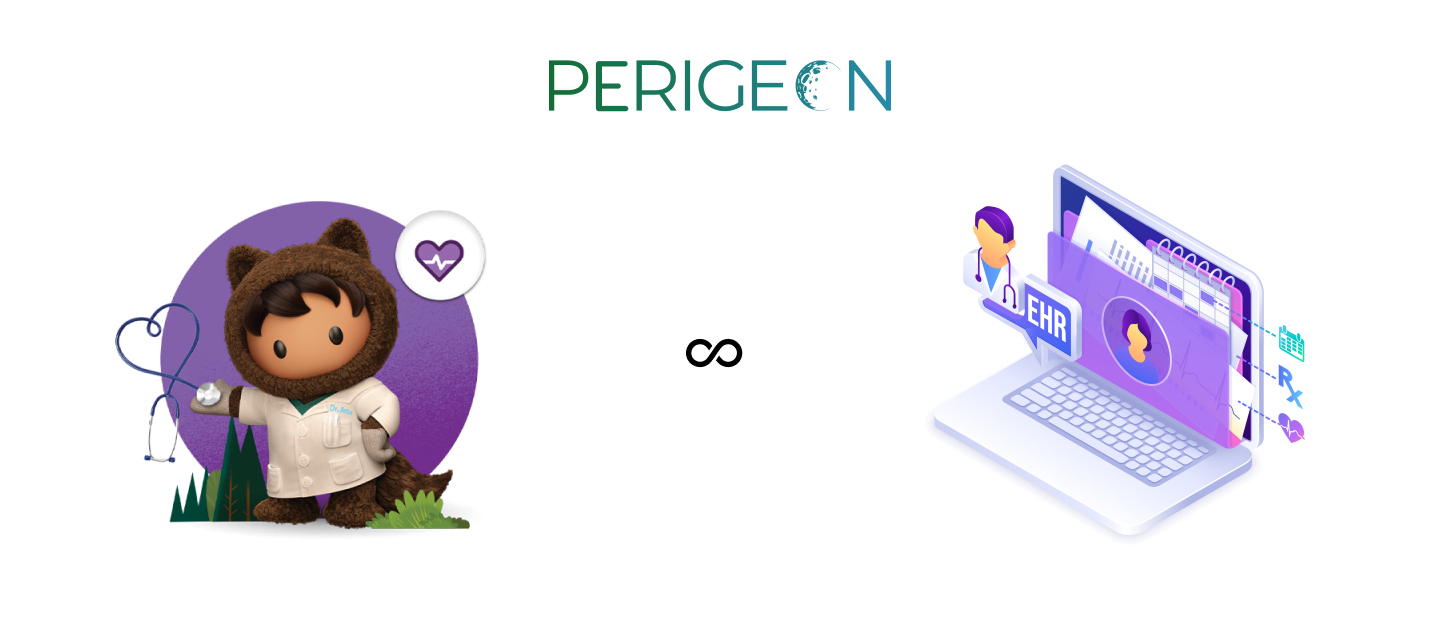The healthcare industry relies on Electronic Health Records (EHR) to manage patient data, from medical histories and treatments to billing information. Salesforce Health Cloud, a leading Customer Relationship Management (CRM) platform, offers a comprehensive solution for patient engagement and care coordination. Integrating EHR with Salesforce Health Cloud allows healthcare providers to streamline operations, improve patient care, and enhance collaboration among healthcare teams.
In this blog post, we will provide a step-by-step guide to integrating EHR with Salesforce Health Cloud and discuss popular EHR systems that are compatible with Salesforce.
Benefits of Integrating EHR with Salesforce Health Cloud :
Before diving into the integration process, let’s explore why integrating EHR with Salesforce Health Cloud is beneficial for healthcare providers:
- Unified Patient View: Integration creates a single source of truth for patient information, leading to improved care coordination and personalized treatment.
- Enhanced Patient Engagement: Salesforce Health Cloud’s communication tools, combined with EHR data, enable personalized patient engagement and better patient experiences.
- Streamlined Workflows: Automated data exchange between EHR and Salesforce reduces manual tasks and minimizes errors.
- Improved Collaboration: With a unified platform, healthcare teams can collaborate more effectively, resulting in better patient outcomes.
- Real-Time Insights: Integration enables real-time data analysis, supporting informed decision-making and proactive patient care.
Given these benefits, let’s now look at some of the common challenges in EHR integration and how to overcome them.
Common Challenges in EHR Integration with Salesforce Health Cloud :
EHR integration can be complex due to various factors, including data security, regulatory compliance, and system compatibility. Here are some common challenges and ways to address them:
- Data Security and Compliance: Healthcare data is sensitive and subject to regulations like HIPAA. Ensure that the integration meets security standards and complies with all applicable regulations.
- Interoperability: Different EHR systems use varying data formats and standards. Use integration tools that support common healthcare data standards, such as HL7 and FHIR, to ensure interoperability.
- Data Consistency and Accuracy: Integration can lead to data discrepancies if not managed properly. Implement data validation processes to ensure consistency and accuracy during integration.
- Workflow Disruption: Introducing new technology can disrupt existing workflows. Plan for change management and provide training to ensure a smooth transition.
By addressing these challenges, you can create a successful EHR integration with Salesforce Health Cloud.
Step-by-Step Guide to EHR Integration with Salesforce Health Cloud :
Ready to integrate your EHR with Salesforce Health Cloud? Follow these steps to ensure a smooth integration process:
Step 1: Define Integration Goals
Start by identifying the specific data you want to exchange between the EHR and Salesforce Health Cloud, such as patient demographics, medical history, or appointments.
Step 2: Choose an Integration Tool
Select an integration tool that supports common healthcare data standards and can bridge the gap between your EHR and Salesforce Health Cloud. Look for tools with strong security features, customization options, and robust support.
Step 3: Establish Data Mapping and Workflows
Define how data from the EHR should be mapped to Salesforce Health Cloud. Consider the fields, objects, and relationships that need to be established for seamless data exchange. Design workflows to automate data synchronization and define triggers for specific actions.
Step 4: Ensure Data Security and Compliance
Ensure that the integration tool complies with healthcare regulations like HIPAA. Implement data encryption, secure access controls, and audit logs to maintain data security.
Step 5: Test the Integration
Before fully implementing the integration, conduct thorough testing to ensure data accuracy and system compatibility. Create test cases to validate data mapping, workflows, and error handling. Address any issues that arise during testing.
Step 6: Train Healthcare Teams
Provide training to healthcare teams on how to use the integrated system. Ensure that they understand how to access patient data, update records, and leverage Salesforce Health Cloud’s features. Encourage feedback to improve the integration process.
Step 7: Monitor and Optimize
After the integration is live, monitor its performance to ensure data synchronization is consistent and accurate. Use monitoring tools to track system health and address any issues promptly. Optimize workflows and data mapping as needed to improve efficiency.
Popular EHR Systems on Salesforce Health Cloud
Several popular EHR systems integrate with Salesforce Health Cloud, allowing healthcare providers to unify patient information and enhance workflows. Let’s look at some of these EHR systems and their unique features:
Epic
Epic is one of the most widely used EHR systems, known for its comprehensive features and scalability. Epic’s integration with Salesforce Health Cloud allows healthcare providers to share patient data, streamline workflows, and enhance patient engagement.
Key Features:
- Comprehensive patient records and medical history.
- Integration with Salesforce for streamlined data exchange.
- Tools for care coordination and patient engagement.
Cerner
Cerner is another leading EHR system that integrates with Salesforce Health Cloud Is Salesforce Health Cloud the Right Fit for Your Organization?. It offers a wide range of healthcare solutions, including clinical workflows, billing, and patient engagement tools.
Key Features:
- Comprehensive EHR with support for clinical workflows and billing.
- Integration with Salesforce for enhanced patient engagement.
- Tools for care coordination and collaboration.
Athenahealth
Athenahealth is a cloud-based EHR system that integrates seamlessly with Salesforce Health Cloud. It provides tools for electronic health records, medical billing, and patient engagement.
Key Features:
- Cloud-based EHR system with flexible integration options.
- Integration with Salesforce for automated data exchange.
- Tools for patient engagement and medical billing.
NextGen Healthcare
NextGen Healthcare is an EHR system that offers integration with Salesforce Health Cloud. It provides tools for electronic health records, practice management, and patient engagement.
Key Features:
- EHR system with support for practice management and patient engagement.
- Integration with Salesforce for streamlined workflows.
Tools for care coordination and patient communication.
Integrating EHR with Salesforce Health Cloud can revolutionize healthcare operations, providing a unified platform for managing patient data and improving care coordination. While integration can be complex, following the step-by-step guide outlined in this blog post can help ensure a smooth and successful process.
Popular EHR systems like Epic, Cerner, Athenahealth, and NextGen Healthcare offer Salesforce Health Cloud integration, allowing healthcare providers to choose the best solution for their needs. If you’re considering EHR integration with Salesforce Health Cloud, explore these systems to find the perfect fit for your healthcare organization.
Perigeon Software goes beyond being just a tech solutions provider; we’re your dedicated partners on the journey to success. We’ve forged strong alliances with industry leaders such as Salesforce, dbt Cloud, and BigCommerce to bring you more than mere services we bring innovation personalized to your unique needs.
With Salesforce, we’re not just implementing CRM solutions; we’re helping you foster meaningful customer relationships.
At Perigeon, these partnerships are more than just collaborations – they signify our commitment to making technology work intimately for you, ensuring your business not only adapts but thrives in today’s dynamic landscape.
Drop us a mail at possibilities@perigeon.com to discuss your business requirement.



